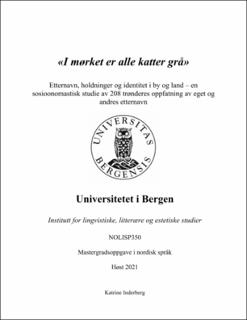| dc.contributor.author | Inderberg, Katrine | |
| dc.date.accessioned | 2022-01-11T00:50:59Z | |
| dc.date.available | 2022-01-11T00:50:59Z | |
| dc.date.issued | 2021-12-06 | |
| dc.date.submitted | 2022-01-10T23:00:07Z | |
| dc.identifier.uri | https://hdl.handle.net/11250/2836799 | |
| dc.description.abstract | Denne oppgaven undersøker et utvalg nordmenns forhold til etternavn. I oppgaven har jeg tre hovedtemaer: hvorvidt informantene opplever etternavnet sitt som del av deres identitet, hvilke holdninger informantene har til eget etternavn, og andres etternavn. Hensikten var å bidra til økt faglig kompetanse i den sosioonomastiske fagdisiplinen, ved å blant annet å undersøke sosiale, geografiske og sosioøkonomiske problemstillinger. Etternavntyper har vært et sentralt fokus i denne oppgaven, og jeg har undersøkt om det ligger forskjeller i svarene til informantene, basert på hvilke etternavn de har. Utvalget mitt består av 208 informanter som er fylt 40 år og kommer fra Trøndelag, og som har svart på en spørreundersøkelse sendt ut via mail. Den metodiske tilnærmingen brukt i undersøkelsen, er en kombinasjon av kvalitativ og kvantitativ metode, på fagspråk kalt mixed methods research. Bakgrunn for valg av metode var å kunne vise til tellbare data, men samtidig gå mer inngående i besvarelser og kommentarer fra informantene, som kunne gi mer dybde til oppgaven. Resultatene har jeg sammenlignet med Solveig Wikstrøms Etternavn og identitet – 314 osloenseres forhold til eget etternavn (2009a), som en sekundærkilde i oppgaven. Det hevdes at få ting er nærere knyttet til identiteten enn navnet vårt. Studien viser at etternavn enten er en veldig viktig eller nokså viktig del av identiteten til informantene, og det er flest informanter med sammensatte gårdsnavn som opplever navnet som viktig. Jeg har vist at å identifisere seg med etternavnet sitt har sammenheng med å like etternavnet sitt, som undersøkelsen viser at de fleste informantene gjør. De vanligste grunnene til at de liker navnet er familiehistorie, identitet og stedstilknytning. Ved å undersøke oppfatninger til andre typer navn, har jeg avdekket holdninger til navn som oppfattes som fine og mindre fine, navn som forbindes med høy og lav formue, og navn som forbindes med by og land. | |
| dc.description.abstract | This master thesis investigates a selection of Norwegians and their relation to surnames. In the thesis I have three main subjects: whether the informants see their surname as a part of their identity, what attitude does the informants have towards their own, as well as towards other surnames. The intent was to contribute to increased professional competence in the socioonomastic subject matter, by among other things, investigating social, geographic and socioonomastic issues. Different types of surnames have been a key focus in this thesis, and I have researched whether or not there are differences in the answers from the informants, based on their surnames. My selection consists of 208 informants who are all above the age of 40, and who were born and still lives in Trøndelag. They have all answered a survey that was sent to them by e-mail. The methodical approach used in this survey is a combination of qualitative and quantitive method, called mixed methods research in professional language. The reason behind the choice of method was to be able to show the data, and at the same time be able to dive deeper into the answers and comments from the informants, which in turn could bring further depth to the thesis. The results have been compared to Solveig Wikstrøm’s master’s thesis: Etternavn og identitet (Surnames and identities), as a secondary source to the thesis. It is said that few things are more closely attached to one’s own identity, than our name. The study shows that the surname is either a really important part, or somewhat important to the identity of the informants, and it is mostly informants with an estate name who perceive their name as important. I have shown that identifying with your surname has a strong correlation to liking the name, which the study shows that most informants do. The most common reasons for liking their names are family history, identity and a connection to the place the surname originates from. By investigating perceptions that the informants had towards other types of surnames, I have uncovered pre-existing attitudes towards surnames considered to be upper-class as well as towards names considered to be lower-class, names associated with wealth and poverty, and names associated with the city or the countryside. | |
| dc.language.iso | nob | |
| dc.publisher | The University of Bergen | |
| dc.rights | Copyright the Author. All rights reserved | |
| dc.subject | Sosioonomastikk | |
| dc.subject | holdninger | |
| dc.subject | identitet | |
| dc.subject | navnegransking | |
| dc.subject | etternavn | |
| dc.title | «I mørket er alle katter grå» Etternavn, holdninger og identitet i by og land – en sosioonomastisk studie av 208 trønderes oppfatning av eget og andres etternavn. | |
| dc.title.alternative | «All cats are grey at night» Surnames, attitudes and identity in the city and countryside – a socioonomastic study of 208 people living in Trøndelag, and their perception of one’s own, and others’ surname. | |
| dc.type | Master thesis | |
| dc.date.updated | 2022-01-10T23:00:07Z | |
| dc.rights.holder | Copyright the Author. All rights reserved | |
| dc.description.degree | Mastergradsoppgave i nordisk språk og litteratur | |
| dc.description.localcode | NOLISP350 | |
| dc.description.localcode | MAHF-LÆNO | |
| dc.description.localcode | MAHF-NORD | |
| dc.subject.nus | 711123 | |
| fs.subjectcode | NOLISP350 | |
| fs.unitcode | 11-21-0 | |
